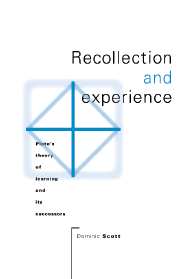Book contents
- Frontmatter
- Contents
- Acknowledgements
- Abbreviations
- GENERAL INTRODUCTION
- SECTION I PLATONIC RECOLLECTION
- Introduction
- 1 The Meno
- 2 Recollection in the middle period
- SECTION II ARISTOTELIAN EXPERIENCE
- SECTION III HELLENISTIC CONCEPTS
- SECTION IV INNATISM IN THE SEVENTEENTH CENTURY
- CONCLUSION
- Bibliography
- Index of ancient passages
- General index
2 - Recollection in the middle period
Published online by Cambridge University Press: 03 December 2009
- Frontmatter
- Contents
- Acknowledgements
- Abbreviations
- GENERAL INTRODUCTION
- SECTION I PLATONIC RECOLLECTION
- Introduction
- 1 The Meno
- 2 Recollection in the middle period
- SECTION II ARISTOTELIAN EXPERIENCE
- SECTION III HELLENISTIC CONCEPTS
- SECTION IV INNATISM IN THE SEVENTEENTH CENTURY
- CONCLUSION
- Bibliography
- Index of ancient passages
- General index
Summary
Nothing in the Meno suggests that recollection is used to explain the emergence of our pre-philosophical judgements; furthermore, the conclusion of the dialogue shows the signs of a double-origin theory emerging in Plato's thought. In this chapter we shall argue for the Demaratus interpretation of recollection in the middle period, starting with the Phaedo in [1] before turning to the Phaedrus in [2] and finally looking at some relevant passages from the Republic in [3].
THE PHAEDO
Our focus of attention here will be on the famous recollection passage in the Phaedo 72e3–77a5. Socrates' eventual purpose in this argument is to prove the immortality of the soul; and his precise intention at this stage is to demonstrate that the soul must have existed before birth. Using the form of the equal as an example, Socrates claims that we have knowledge of the form, that we compare sensible equal objects with it, and that in order to make this comparison, we must already have knowledge of the form. He then tries to argue that we must have had knowledge of the form before we started to use our senses, and that the only time for this to have been is before birth; therefore the soul must have existed before birth. Many commentators have interpreted this passage as saying that recollection of the forms accounts for concept formation as well as the ability to compare forms and particulars. For most of my discussion of the Phaedo I shall focus upon two closely related questions: first, what is recollection intended to explain? Second, who actually recollects? This second question arises because Socrates frequently talks in the first person plural and it is important to determine whether he is referring only to his circle of philosopher-friends or to people in general.
- Type
- Chapter
- Information
- Recollection and ExperiencePlato's Theory of Learning and its Successors, pp. 53 - 86Publisher: Cambridge University PressPrint publication year: 1995



